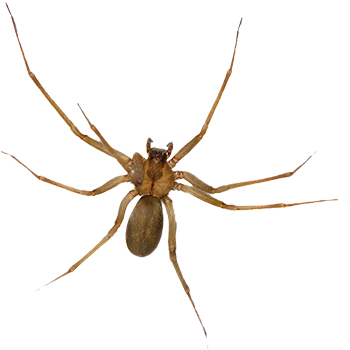Spider Control and Prevention

For many, the mere glimpse of a spider in your home or business can send chills down your spine. But these eight-legged pests aren’t just unsavory to look at. Spiders can be dangerous to you, your family, your pets, and your customers. Whether it’s a “harmless” daddy longlegs or a dangerous spider like the brown recluse or black widow, it doesn’t matter. To protect your home or business from spiders, you need to learn about the behavior of this pest, take steps for prevention, and find effective treatment options should an infestation occur.
What Are Spiders?
Spiders are eight-legged arthropods equipped with fangs able to deliver venom that may be harmful to their victims depending on the specific species. While glamorized by Halloween culture, these creepy-crawlies have the potential to deliver painful bites with lasting health effects. Spider control experts explain, unlike insects, spiders do not have antennae that can help in the identification process.
Spiders are part of the arachnid class of arthropods, a class of invertebrate animals with jointed legs that include other commonly known pests like scorpions, mites, and ticks.
How Do I Identify Spiders?
Identifying spiders in your home or business in New Jersey, Pennsylvania, Maryland, and Delaware, is an important step in assessing the dangers these pests may pose and a good first step in creating an effective spider prevention plan. While the best advice is always to turn to a spider control expert, you can utilize resources and some basic information to begin the ID process yourself. Spiders, in general, are easy to identify by looking for eight-legged creatures with no antennae and jointed legs. Do be aware that in some species, the front pair of legs operate as sensory devices and may not resemble the same structure as the other six legs. Don’t mistake these for harmless six-legged insects.
Once you’ve identified that you are dealing with spiders, you’ll want to identify the type of spider to assess the threat properly and begin your spider treatment. The experts at Viking Pest are certified to properly identify spider species and will recommend an effective treatment for your home or business
While there are over 48,000 species of spiders in the world, there are more common types in the New Jersey, Pennsylvania, Maryland, and Delaware areas. Common spiders you’ll find in New Jersey, Pennsylvania, Maryland, and Delaware include the American house spider, wolf spiders, orb weavers, cellar spiders (daddy longlegs), brown recluses, and black widows.
How Do I Get Spiders?
Unfortunately, the process to get spiders and spider nests in your home or business is not a complicated one. Exterminators explain the mere absence of a proactive spider prevention plan can leave you vulnerable. That being said, there are conditions these pests are more attracted to. Here are three reasons you may be at risk for these pests in your home or business in New Jersey, Pennsylvania, Maryland, or Delaware.
- Food sources: If you’re leaving food out, have easily accessible trash, or aren’t keeping your home as clean as you can, spiders will be attracted. These food sources attract bugs, which in turn attract spiders.
- Damage to your home or business: Spiders aren’t capable of opening doors, but they are capable of squeezing through tiny cracks, holes, or crevices. Additionally, while spiders can’t open doors, they have no problem crawling through one that’s been left open.
- Conditions outside of your control: You can have the cleanest home or business on the block, but spiders may still be looking for a new stomping ground. When the weather gets too hot, cold, or wet, spiders go on the move looking for somewhere with more favorable conditions to live and build spider nests.
What Are The Effects of Spiders In and Around My Home or Business?
Venomous spiders pose a safety risk to you, your family, your pets, and your customers. The severity of the risk will depend on the type of spider. In New Jersey, Pennsylvania, Maryland, and Delaware, many of the most common types of spiders found including the black widow, the brown recluse, the wolf spider, and the long-legged sac spider pose significant risks. Even most non-venomous variants still possess the ability to bite.
Besides the obvious risk mentioned, spiders can also have other negative effects on your home or business. These pests spin webs in inopportune places, can scare away family and customers, and have the ability to multiply quickly. For example, the venomous black widow spider can lay up to nine cocoons with each containing anywhere from 200-800 eggs! A small infestation can quickly multiply into a larger problem if you don’t get rid of spiders immediately.
Yes, spiders do eat insects and other pests. However, if your home or business is also free of insects and other pests, there’s no benefit to keeping spiders around.
How Do I Prevent Spiders?
Prevention of spiders should be a multi-tiered approach. Utilizing professional assistance from the experts at Viking Pest goes a long way to keeping spiders out of your home or business in New Jersey, Pennsylvania, Maryland, or Delaware. Here are a few ways exterminators recommend you can begin protecting your home or business from these pests today.
- Keep your home or business clean, free of undisturbed clutter, and don’t leave food products or trash lying around.
- Identify and eliminate any deficiencies in your home or business’ exterior that could permit entry for spiders. Look for cracks under doors, windows not sealed perfectly, broken window screens, and doors or windows regularly left ajar.
- Swap outside lights to yellow sodium vapor lights. These lights will not attract insects and other bugs that serve as attractive food sources for spiders.
- Utilize air-tight storage containers for long-term storage needs, especially in garages, attics, and basements.
- Eliminate a spider problem quickly. If you wait to address a known issue, you’ll give the pest time to replicate, and a small problem can become much more challenging to manage.















